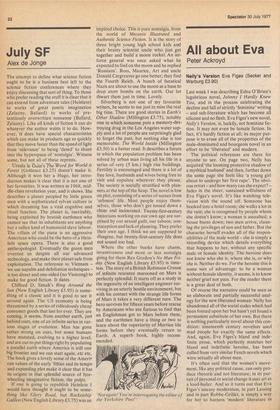July SF
Alex de Jonge
The attempt to define what science fiction ought to be is a business best left to the science fiction conferences where they enjoy discussing that sort of thing. To those who prefer reading the stuff it is clear that it can extend from adventure tales (Heinlein) to works of great poetic imagination (Zelazny, Ballard) to works of pretentiously overwritten nonsense (Ballard, Zelazny). Like all kinds of fiction it can do whatever the author wants it to do. However, it/ does have special characteristics which can make its products age so quickly that they move faster than the speed of light from 'relevance' to being 'dated' to shunt into the hyperspace of 'nostalgia'. Witness some, but not all of these reprints.
Ursula le &iiti's-The-Word for World is Forest (Ciollancz £3.25) doesn't make it. Although it won her a Hugo, her introduction makes it clear that it is not one of her favourites. It was written in 1968, mid. die-class revolution year, and it shows. She describes a planet peopled by little green men with a sophisticated sylvan culture in which dreaming has a vital cognitive and ritual function. The planet is, inevitably, being exploited by brutish earthmen who cannot see that its inhabitants are anything but a sullen kind of humanoid slave labour. The villain of the piece is an aggressive American who could be the hero of a Heinlein space opera. There is also a good anthropologist. Eventually the green men overrun us despite all our advanced technology, and make their planet safe from exploitation. The reference to Vietnam — we use napalm and defoliation techniques— is too direct and one-sided (no Vietcong) to make for good fiction: It dates.
Clifford D. Simak's Ring Around the Sun (New English Library £5.95) is something of a classic and it is good to see it around again. The US economy is being threatened by a series of ridiculously cheap consumer goods that last for ever. They are coming, it seems, from another earth, just behind ours, one of an infinite series in various stages of evolution. Man has gone rather wrong on ours, but some humans have mutated, evolving to a higher level, and are out to put things right by populating a parallel earth where America is still one big frontier and we can start again, etc etc, The book gives a lovely sense of the Ameri. can values of the early 'fifties and its tempo and expanding plot make it clear that it has its origins in that splendid source of freewheeling imaginative fiction, the pulps. If one is going to republish Heinlein I would have thought it ought to be something like Glory Road, but Rockets/up Galileo (New English Library £3.75) was an inspired choice. This is pure nostalgia, from the world of Mecanix Illustrated and Authentic Science Fiction. It is the story of three bright young high school kids and their brainy scientist uncle who just get together and build a moon rocket. An airforce general was once asked what he expected to find on the moon and he replied 'Russians'. Ross, Maurice, Art and uncle Donald Cargreaves go one better; they find the Fourth Reich. A bunch of fanatical Nazis are about to use the moon as a base to drop atom bombs on the earth. Our lot thwart them just in time. Lovely.
Silverberg is not one of my favourite writers, he seems to me just to miss the real big time. There are good stories in Earth's Other Shadow (Millington £3.75), notably one in which someone puts a memory-destroying drug in the Los Angeles water supply and a lot of people are surprisingly glad to forget the past, but nothing else is too memorable. The World Inside (Millington £3.50) is a better read. It describes a future in which the population problem has been solved by urban man living all his life in a series of very (5 km.) high rise buildings. Fertility is encouraged and there is a lot of free love, husbands and wives being free to visit and copulate wherever they please. The society is socially stratified with planners at the top of the heap. The novel is low on plot, consisting of a series of scenes from `urbmon' life. Most people enjoy themselves, those who don't get tossed down a chute and incinerated. Twenty-first-century historians working on our own age are surprised by our sexual guilt, our taboos, contraception and lack of planning. They prefer their own age. I think we are supposed to disagree, but twenty-first-century life does not sound too bad.
Where the other books have charm, inventiveness and more or less nostalgia going for them Rex Gordon's No Man Friday (New English Library £5.95) is timeless. The story of a British Robinson Crusoe of infinite resource marooned on Mars is perfectly splendid. It starts off as a study in the ingenuity of an intelligent engineer surviving in an utterly hostile environment, but with his contact with the strange life forms Of Mars it takes a very different turn. The hero survives for fifteen years before rescue by Americans who are furious to find that an Englishman got to Mars before them, and the earthmen have a thing or two to learn about the superiority of Martian life forms before they eventually return to Earth. A superb book, highly recommended.


































 Previous page
Previous page